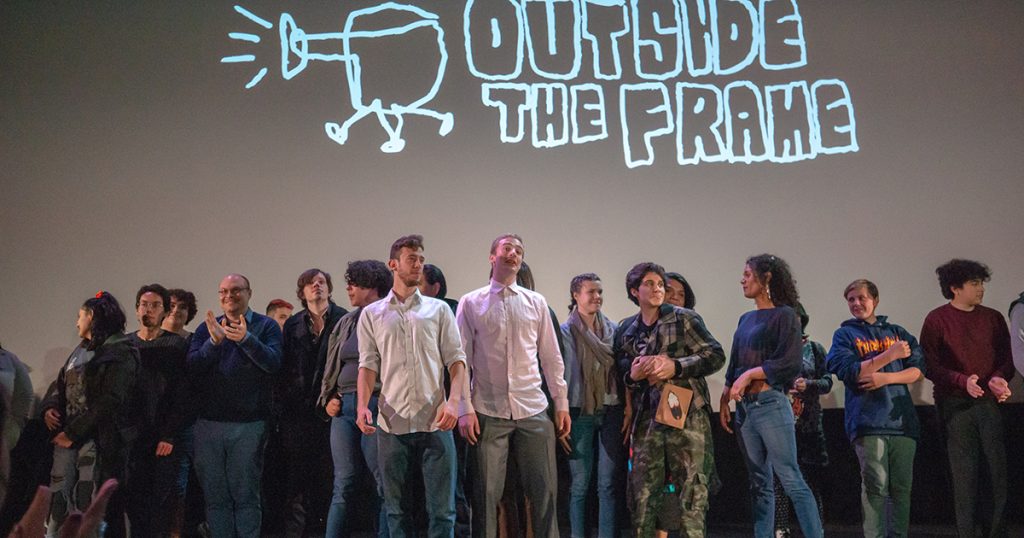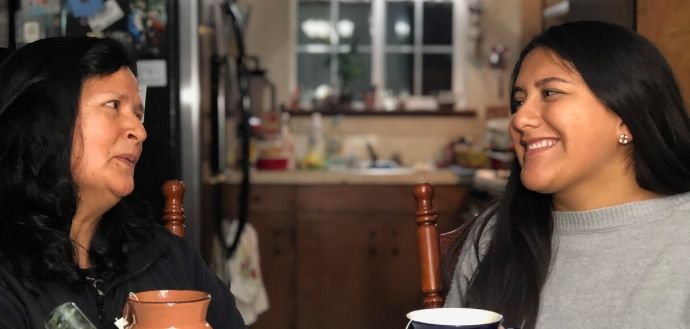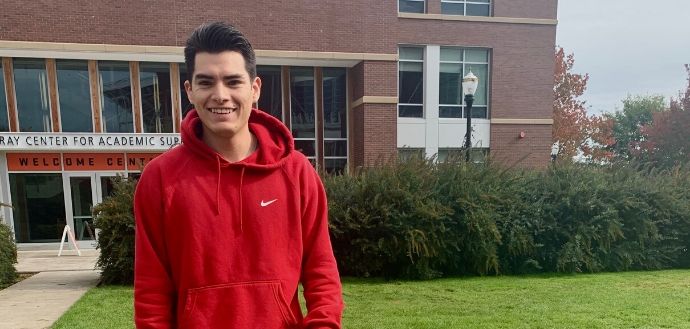
The statistics were grim, and the stories were painful. So Jonathan Garcia asked why – and how he might make a difference.
Enter, ENLACE. The Engaging the Next Latinx Allies for Change and Equity program builds solidarity and amplifies youth voices, connecting Latinx and lesbian, gay, bisexual, transgender, queer and questioning youth in fighting social isolation.
“The need for this project originates from the epidemic of isolation, suicide and self-harm that is killing our queer youth today,” says Jonathan, a CPHHS assistant professor. “These videos give youth the opportunity to amplify their story so that their worst experiences with isolation can be transformed into powerful tools that help others.”
Jonathan says the health and social consequences of isolation motivates him and his diverse team, including Associate Professor Mario Magaña Álvarez, CPHHS doctoral student Nancy Vargas, Jesse Clark at UCLA, the Brazilian Interdisciplinary AIDS Association and Outside the Frame, which helps youth create films about issues that matter to them.
In February 2019, they invited Latinx parents, Latinx 4-H alumni, LGBTQ Latinx youth and health providers and educators to participate in four community advisory boards.
The 45 people on these boards then developed ENLACE’s themes: building solidarity among youth with multiple marginalized identities; addressing bullying and cyberbullying; navigating norms in social institutions, including family, church and school; exploring the meanings of citizenship; and accessing health and social service resources.
They then brought together a group of 10 Latinx LGBTQ+ youth to create a telenovela – soap opera – toolkit to train peers to combat social isolation. Inspired by interventions used in Brazil and Peru to address community-based stigma, the telenovela-style toolkit will be piloted among Latino youth allies through 4-H Outreach Leadership Institutes to help participants address the bullying and discrimination that occurs in various social environments, such as in their work as camp counselors.
As a result of ENLACE, Jonathan says Latinx youth will be better equipped to understand the struggles of LGBTQ+ youth by drawing on their own experiences of marginalization, including immigration status, poverty and more.
Latinx youth in grades 9-12 can experience the telenovela-style training by participating in the 4-H Outreach Leadership Institutes’ pilot program, taking place in May 2020. ENLACE is funded by a grant from the Robert Wood Johnson Foundation.
If you would like more information about the project, contact Jonathan Garcia.
Voices from ENLACE

Cynthia
Cynthia De La Torre, from Albany Ore., is an HDFS major who has been involved in 4-H several years. A 4-H volunteer, Cynthia also serves as a student leadership liaison at the Centro Cultural Cesar Chavez Cultural Center.
“Often times, we talk about race and ethnicity or class, but we don’t talk about gender or sexuality as much,” she says. In the Latino community in the U.S., we have certain ways of thinking based on how we were raised – and it hurts people. Now I know there are many ways for people to identify themselves.
“For people who are in the learning process, it can come as a shock,” she says. “Sometimes, the community doesn’t to want to recognize this fact due to our ignorance or the fear that comes from change. This curriculum will help youth feel included, respected and safe. It’s going to help start conversations within 4-H in how to imagine a brighter future for everyone. I feel so happy that this program will be implemented. We are all different, and that is good!
“I can see ENLACE paving a path for how we build relationships within the Latinx community—to care for another and to trust that we will support another in our pursuit of self-expression—freedom to be who we are. It will equip youth in ways of confronting adversity, holding one another accountable, teaching each other how to do better in their inclusion and care to their LGBTQ+ peers. Together this program will open a dialogue on Latinx LGBTQ+ visibility and empowerment and awareness of needs. It will hopefully cultivate a shared sense of responsibility to intervene or prevent harm from occurring.”
Cynthia’s mother, Cecilia
Actively involved in the community, Cecilia De La Torre attends church regularly and often attends programming for the Latinx community to better the health and knowledge of her family and all residents. She says she hasn’t seen similar programming and thinks it can provide the right type of support for LGBTQ youth to feel included, respected and accepted.
“I think it is very painful to know that these high rates of suicide are occurring among LGBTQ youth. It is very difficult to come up with a solution, but I think teachers should collaborate with specialists to make sure these youths are talked to and to make sure they are accepted and that their peers show compassion and adults, too. We as adults need to educate ourselves in having more compassion and treating them with respect and dignity.
“I want parents to know that there is a lot of bullying our children face due to a lack of acceptance, understanding and knowledge,” she adds. I have been talking to moms, and there is a variety of points of view. Some people avoid the subject altogether, and some with LGBTQ children don’t accept the children the way they are. It is good to talk about these topics and to keep educating ourselves.”
Erik
Erik J. Escamilla Marquez de Alonso is a Portland Community College student and 4-H summer camp volunteer from Hillsboro, Ore., who saved his money to pay for his cousins to attend camp because he saw firsthand the difference it made in campers’ lives. Erik is applying for residency and eventually to become a U.S. citizen. For Erik, a part of citizenship means standing up for others.

He has been part of 4-H for about two years and has attended the Oregon Migrant Leadership Institute. While serving as a 4-H camp counselor, he experienced a camper calling out another student for being gay. He says he realized that although he had gay friends, he didn’t understand the struggles they went through for not being accepted or for being bullied.
“This experience made me question the homophobia that we have in our Latino culture from the streets, sports and even politically,” he says. The result is toxic masculinity and a message sent to many LGBTQ Latino youth: “You better not be gay because I will not accept you.
“Looking back, I realize that these comments and ideas were all around me growing up,” he says. “The LGBTQ community is not as accepted in the Latino community. The needs of these youth need to be talked about by the people in my community. In Latin America, there is a lot of discrimination against the women and the LGBTQ community, which is exemplified by the higher rates of murder of transgender people and women. Some religious leaders call for the persecution of gay people. Too much bullying occurs for being gay and we need to start talking about it so we can all be understanding and more compassionate toward all people.”

Eduardo
Eduardo Lopez-Parra is from Beaverton, Ore., and is a junior studying kinesiology in the CPHHS. Involved in 4-H for five years, he believes that there is a need for ENLACE. “It’s an inclusive program that unifies people of different colors, ethnicities and sexual orientations and allows participants to gain long-term skills to help them succeed in college and beyond.”